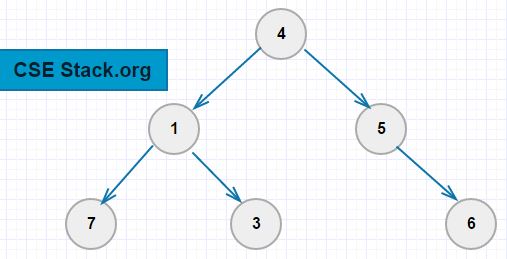Traversing elements in postorder traversal with recursion is easy. You can read the postorder traversal in detail where I have explained it with binary tree example and code.
Table of Contents
You have given a binary tree. Implement PostOrder Traversal Without Recursion.
Here we are going to use the iterative method to traverse binary tree elements
(This problem was asked in the OVH cloud interview round. You have to write working code on the whiteboard.)

The postorder traversal of the Binary tree is 7 3 1 6 5 4.
Here we are going to use the stack. Each element in the stack will maintain the current node and the flag. The flag will be set to True if the children of the current node are not visited.
In Python, the stack can be implemented using a Python list.
If you understand the logic and algorithm, you can implement it in many programming languages like C/C++, Java, Python…
#structure/class for a node
#by defult, left and right pointers are None
class node:
def __init__(self, val, left=None, right=None):
self.left=left
self.val=val
self.right=right
#adding element in the binary tree
root=node(4)
root.left=node(1)
root.right=node(5)
root.left.left=node(7)
root.left.right=node(3)
root.right.right=node(6)
#return True if the node has child
#retun False if node has no child
def isChild(node):
if node.right or node.left:
return True
else:
return False
#print post order traversal
#without recursion
def printPostOrderWithoutRec(node):
liNode = []
if node:
liNode.append([node, isChild(node)])
else:
print("Tree is empty.")
return
while liNode:
curNode, bChild = liNode[-1]
if bChild:
liNode[-1][1] = 0
if curNode.right:
liNode.append([curNode.right, isChild(curNode.right)])
if curNode.left:
liNode.append([curNode.left, isChild(curNode.left)])
else:
print(curNode.val)
del liNode[-1]
printPostOrderWithoutRec(root)
Output:
7 3 1 6 5 4
What’s Next?
I hope you understood postorder traversal without recursion. You can practice implementing inorder and preorder traversal without recursion.
If you are preparing for an interview with product-based companies, you have to prepare for a binary tree. If you have any queries, you can comment below.